- Posted on November 11th, 2024
Oily Cart – Creating Sensory Theatre with Sustainable and Inclusive International Collaborations
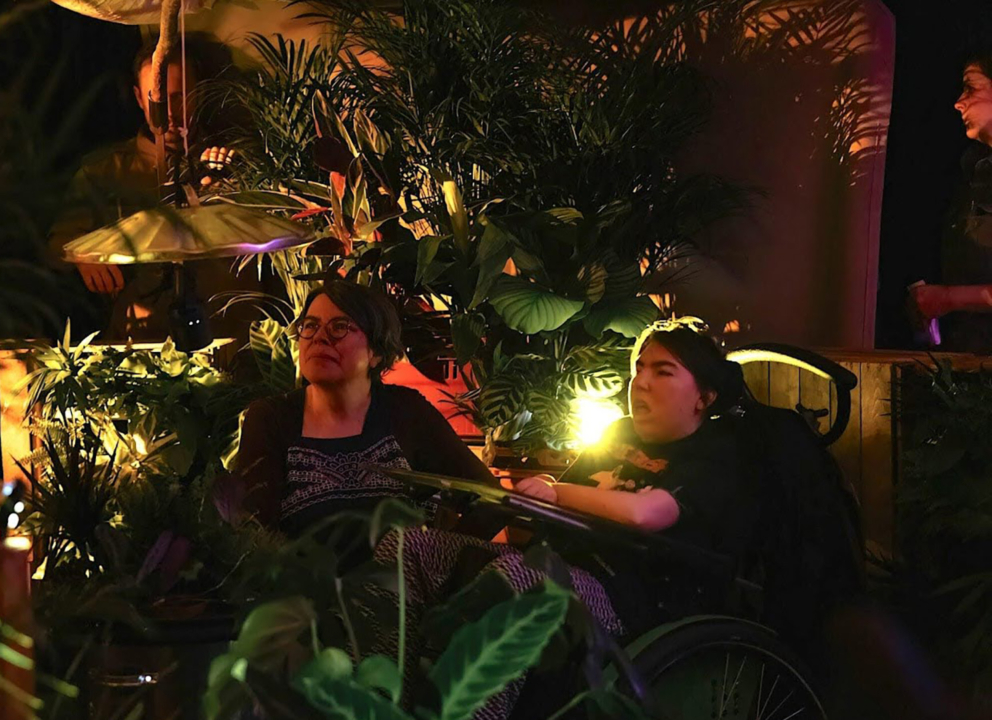
For Arts Council England and Julie’s Bicycle’s annual report 2023-24, we feature over 50 practical examples of cultural organisations taking climate action including 9 other in depth case studies like this one. Check out the full interactive report here.
This case study was written by Oily Cart, a London-based national and international touring company which creates Sensory Theatre for and with disabled children, young people and their families. They share their experience working on an international co-production with an Australian partner which centred on sustainable approaches to co-creating and touring their show.
When The World Turns
We were really excited when we heard that Arts Centre Melbourne wanted to commission a co-production between Oily Cart and Polyglot Theatre for their major arts and disability festival, Alter_State. Polyglot is a leading international company based in Australia that we’ve long admired for their child-led approach to theatre-making.
The seed of the resulting show, When the World Turns, was a conversation between our Artistic Director, Ellie Griffiths, and a parent of a disabled child, about how their family were made to feel that they didn’t belong in natural environments. Other families have shared similar experiences with us:
“Nature is hugely important to us as a family. We are very aware of the access barriers to it, particularly now my child is getting bigger and can’t be carried”
– Parent.
With nature and the environment at its heart, it was even more imperative that sustainability was at the centre of our planning for this collaboration. We wanted to address head-on some of the environmentally unfriendly practices that can arise from international co-productions, like long-haul shipping of set, cast and crew travel, and long-term stays in different countries.
The focus on sustainability asked very new questions of Oily Cart’s work, which has historically used lots of ‘stuff’. Sensory Theatre is very interactive, using every element of the performance environment, including props and set, and an audience-led approach, to engage all 33 senses. In creating an immersive setting that can be felt, smelt, even tasted, the props can be interacted with very intensively and close-up. We have previously always bought new materials, to ensure cleanliness and hygiene. We also always want to use the highest quality materials, to respect this close-up playing space, and to be rigorous in our respect for our audiences.
Sustainable solutions and sister productions
Creatively, we quickly identified Dr Tanja Beer as a leading artist we wanted to work with in Australia: she has literally written the book on eco-scenography. Her work is influenced by biophilia: humanity’s innate love of and need for nature. It was through discovering the 14 biophilic design patterns that Dr Beer uses in her stage design that we found our sensory way into the show. The show’s theme also reflected our environmental lens, celebrating how everyone is an important part of the ecosystem, which needs biodiversity to thrive.
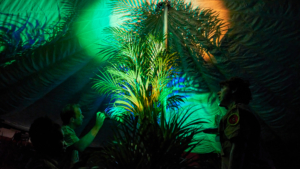
Logistically, we considered what the least environmental impact would be in terms of flights. We settled on our Artistic Director travelling to Australia to collaborate with Polyglot’s Artistic Director, Sue Giles AM, for the rehearsal period and Alter_State run.
Other than that, everything was done digitally between the two countries or separately, but with moments to share and feedback. For instance, each organisation held R&D periods in their own country, collaborating with young people to develop and test ideas for the show. We captured all this via video and photos, and shared learnings over email and Zoom. The UK-based composer created a soundtrack inspired by the themes from the R&D periods. It responded to the biophilic design patterns by including field recordings from the natural world, and was a starting point for the shared sound design that happened digitally.
The wider producing and artistic teams maintained regular contact through (very early morning!) Zooms.
Ellie travelled to Australia for the rehearsal period and initial week of performances at Melbourne Arts Centre in November 2022. We made sure that she would be able to recreate the show based on the original design in the UK, and then redirect a new cast, rather than transporting all the cast, set, props and costumes over here. This also meant we could learn from the initial production as much as possible, working with a UK-based eco-designer, Andrea Carr for the first UK tour the following year.
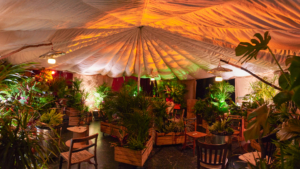
Touring Plants and Manifesto of Care
The show communicates the message that all forms of life should be valued equally. It was important that we honour those values backstage too, creating a ‘safe space’ for all our touring team – humans and plants. We used everything we discovered during our collaboration with Polyglot and Dr Tanja Beer to create the Manifesto of Care ahead of the first UK tour of specialist schools. The Manifesto sets out how we make sure all living beings in our show are cared for. It has set our intentions as an organisation moving forward, and we are determined to keep building on this initial tour.
There were plenty of practical considerations to sourcing and touring plants, too. We couldn’t use the same plants as the Australian production due to the differing climates. In Australia, they could bring outdoor, native plants indoors, whereas we needed to work with houseplants – and, in relation to our target audience (of disabled children who experience the most barriers to access), they had to be non-toxic.
Our company schedule meant we had to tour in the winter, so temperature was an additional pressure, alongside how to provide sufficient light to all the plants.
In Australia they sourced a ‘plant partner’ (local nursery) that loaned all the plants, and provided horticultural advice. We attempted to replicate this in the UK, but the economic challenges for companies, the time of year and the fact that most garden centres are controlled by very few large companies, meant we had limited success. We did receive some donations from social enterprise Share Garden Centre, and a generous discount when purchasing the remainder of the plants.
We definitely came up against crunch moments where it was more of a challenge to follow this new way of working. But there were opportunities too. Having a show design which transfers, rather than tours, means the materials gathered in each location are distinct. The Australian premiere used bush plants and sounds of kookaburras and bullfrogs. The UK version had a completely different feel, and all materials were sourced second hand, so they have the imprint of the local area held in them.
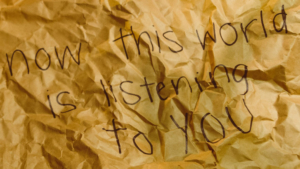
Carbon Footprinting Challenges
The main challenges we faced were:
- The use of live plants required the hire of an additional van
- The changeover of production management staff impacted our ability to collate additional data on materials usage, so our show power remained an estimate
We’re committed to further developing our data collection processes, and to continue to reduce our carbon footprint. One of the things that this experience has underscored is the intersection between access and our environmental responsibility. For our audience who experience the most barriers to access, there will be areas where we have to prioritise their access needs over environmental impact. We will continue to explore this intersection with and alongside the disabled community.
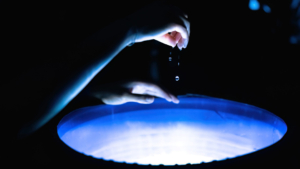
Impact on the Community
For many children and families, there are few opportunities to engage with theatre and our show might be the first they experience. We’re really proud that audiences of the first UK tour found When the World Turns enjoyable, high-quality and accessible. The show received similar positive responses in Australia.
It feels to us that both versions have been successful in welcoming audiences to a natural space, where they can experience the positive effect that plants have on wellbeing. Though the climate crisis is not explicitly acknowledged in When the World Turns, the creative team found the show had the potential to create a deeper understanding of, and connection with, the planet:
“We know the environment and impact of climate change is important, but that can be a cognitive response to science and facts about our physical survival. By bringing this work into the senses and having the natural world experienced in an unexpected context… it becomes powerful personally. It is what may help the audience connect meaningfully to the work and deepen understanding of the planet through a universal but personal relationship.”
– Tirese Ballard, Polyglot Theatre artist & When the World Turns cast member
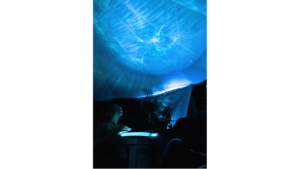
599 people experienced When the World Turns during our UK tour in 2023. We’re looking forward to even more children and families both here and in Australia experiencing the show in coming years.
One of the most fruitful aspects of this collaboration has been seeing how the show develops in different ways across the countries. Polyglot are focusing on a version for schools, which recently won an award for impact. In the UK we have developed an at home version, A World Beneath Us, and a version for babies aged 0-12 months called Great Big Tiny World which will tour UK venues alongside When the World Turns in early 2025. This eco-system gives us all a chance to understand and expand into different dimensions of the imaginary world. Sameness is not required, it is biodiversity in action.
Header image: When The World Turns – Oily Cart – Credit: Roswitha Chesher
Resource Materials
No Climate Action Without Us Toolkit